Related Articles
Related Articles
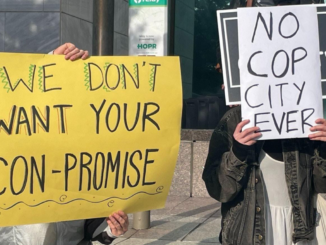
City of Atlanta and DeKalb County Announce ‘Agreement’ Amid Growing Opposition to Cop City
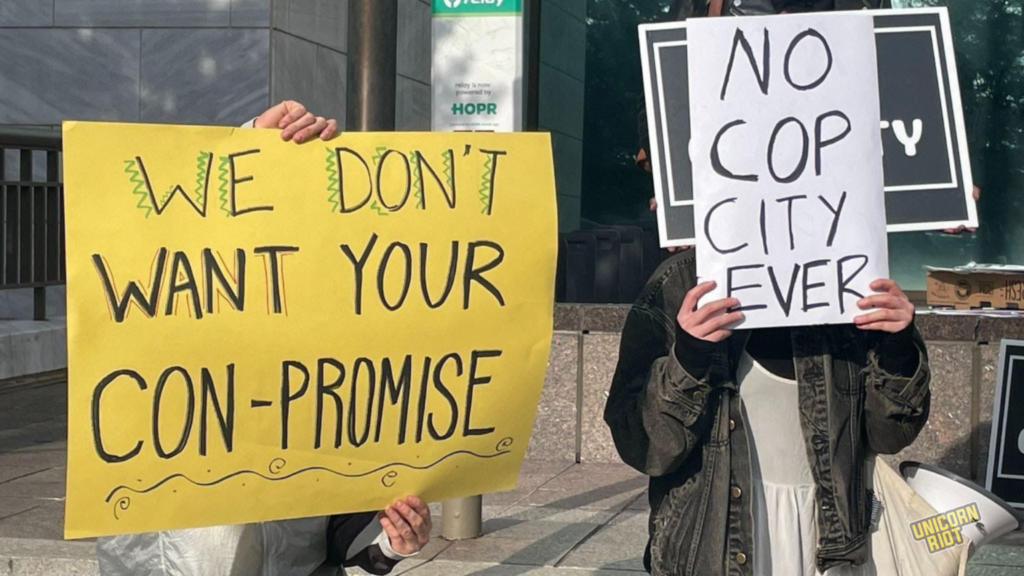
Editor’s Note: This article originally appeared in Unicorn Riot.
ATLANTA, United States—Atlanta Mayor Andre Dickens announced Tuesday that the City of Atlanta and DeKalb County have reached an agreement regarding permitting issues that had previously slowed their plans to build an elaborate 85-acre police training facility in the middle of a forest in unincorporated DeKalb County, southeast of Atlanta. The training center, nicknamed “Cop City,” has sparked massive opposition; violent police repression of the movement against the project recently led to SWAT officers shooting and killing a protester.
Dickens’ announcement varied little from the Atlanta Police Foundation and the City of Atlanta’s previously stated plans. However, apparently responding to criticism from environmental groups and community members, the mayor attempted to reframe the project as environmentally beneficial to the South River watershed and surrounding forest.
“I know there have been questions about the environmental impact of this project, which is a focus of this agreement we’re announcing today with DeKalb County,” said Dickens. “The 85-acre facility will be constructed on a set of parcels owned by the city of Atlanta that totals more than 380 acres. The rest of the land, which is roughly 300 acres, will continue to be green space available to the public.”
Dickens claimed that the area slated for destruction by the city contains only “invasive species, soft woods, weeds, asphalt and rubble.” But those who have been to the forest, including several Unicorn Riot contributors, know that the 85 acres slated for destruction contain an actual, thriving ecosystem.
The mayor has deemed this new plan a “compromise,” but those protesting outside the press conference say no compromise has been reached with them.
“The city has lied about the Cop City acreage before,” wrote some of the protestors in a statement released by the Atlanta Community Press Collective. According to the group, the 85 acres includes only the footprint of buildings, not the entirety of forested acreage that will be destroyed by the project.
“In August 2021, when Atlanta City Council delayed their vote on Cop City, the APF claimed a similar ‘compromise:’ instead of clearing the 381 acres they are leased by the City of Atlanta, the APF would reduce the footprint of buildings and impermeable surfaces to only 85 acres, while more of the land would be cleared and turned into turf fields, shooting ranges, horse stables labeled ‘green space.’”

Jasmine Burnett, with Community Movement Builders, said that her group is not assuaged by promises of “green space” either.
“Our firm line is no cop city anywhere,” said Jasmine Burnett, Organizing Director at Community Movement Builders. “No destruction of the forest at all. I know, they’re trying to harp on the fact that it’s only 85 acres. And allegedly, the rest will be left for public use. But that’s 85 acres too much.”
“We are also calling for the charges to be dropped against all of the protesters who’ve been charged with any crimes, but especially the domestic terrorism charges,” said Burnett. “So yeah, ultimately, the fight to stop cop city continues beyond today, nothing has really changed except for the fact that they at the last minute made all of us come over here for a last minute press conference.”
Jaike Spottedwolf, who was also protesting outside City Hall during the press conference, echoed the concerns that the city continues to lie about the project. “We know how they operate,” they said. “We know that they’re going to get in there, start building and then take the whole thing down at that point, we won’t be able to fight anything.”
In the anonymous press release posted by the Atlanta Community Press Collective, the authors also pointed out that neither this current promise, nor past promises, have been legally binding. Those opposed to the project are concerned it could be nothing more than a ploy to distract opposition to the project.
“Nothing in the lease agreement was binding regarding this promise, and quickly the land disturbance permits shifted — nearly doubling to 171 acres,” the group wrote of the previous deal.
“Like all other points of ‘compromise,’ this has proved empty rhetoric to cover over the undemocratic railroading of this project on to un-represented, disenfranchised residents of Atlanta and Dekalb County. This is more backroom talk between powerful elites and their dark money contributors.”
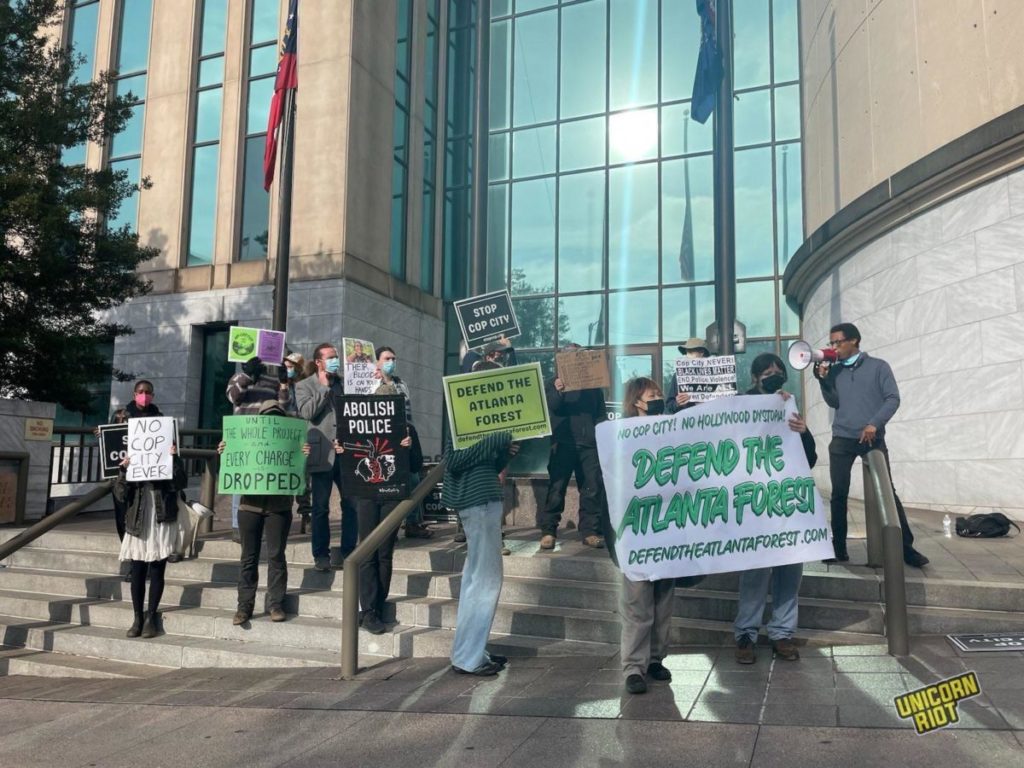
The announcement comes less than two weeks after police shot and killed forest defender Manuel “Tortuguita” Terán, claiming that Terán had shot an Georgia State Patrol trooper in the abdomen during a raid on the forest. Activist groups, however, have called that narrative into question, demanding the release of all information available on the incident to the family for an independent investigation. The trooper who killed Terán has not been named. Protest groups are demanding the release of his name.
During the press conference, neither the politicians nor the police chief mentioned Terán’s killing.

Recently, more than 1,300 climate justice groups have signed a statement calling for the immediate resignation of Mayor Dickens amidst growing controversy over the cop city project and Terán’s killing, according to the Atlanta Community Press Collective.
The ‘green space’ and eco-management aspects of the plan are not new innovations or concessions, but were presented by engineers in an October 26, 2021 meeting of the Community Stakeholder Advisory Committee (CSAC). (Recordings of CSAC meetings were first obtained and released by the Atlanta Community Press Collective).
In the October 2021 meeting, Lily Ponitz, a former environmental engineer serving on the committee as a concerned local resident, told the committee that areas slated for use as public parks include contamination that the Atlanta Police Foundation and the city of Atlanta instructed environmental contractors to ignore – allegations that were not challenged by either hired engineers on the call or the leaders and police officials on the committee. Ponitz was later unceremoniously kicked off the advisory committee due to her dissent regarding elements of the project.
Advisory Committee Chair Alison Clark, who was instrumental in removing Ponitz for her critical comments, is also President of the Boulder Walk Homeowner’s Association.
Here are comments from an exchange from October 21, 2021 meeting of the Atlanta Public Safety Training Center (APSTC) Community Stakeholder Advisory Committee (CSAC):
Bob Hughes [Project Manager working with Atlanta Police Foundation]: And I think it’s important to point out, because I know last time we there was some express about concern of making sure if there’s an environmental issue that needs to be cleaned up, that it’s addressed, that that this environmental study is not just inside the 85 acres that are the Police Foundation lease land, but we’re looking at everything outside of that so that, you know, if there’s something there, we want to know it.
And I think you all want to know, we all want to know that gets cleaned up.
Lily Ponitz: So that’s just where I actually don’t think what you’re saying is true. And I would like to see on a map exactly what areas you are defining in your environmental site assessment and what areas are in the plan for the site plan.
Alan Williams [Project Manager, Atlanta Police Foundation]: Well, our Phase One is in the public right now.
Lilz Ponitz: Yeah, I know. I’ve read it.
So what I’m saying is, there are areas in the site that you guys left out investigating and I understand APF [Atlanta Police Foundation] told you to do that or the city of Atlanta told you to do that. They’re your client. But what I’m trying to advocate for is a full assessment of the whole property to actually understand the contamination that has been put on the site by the City of Atlanta so that when you open up park spaces that have not been remediated we don’t have citizens who are coming into contact with contaminated soil and contaminated water like they already have been, honestly, with Intrenchment Creek. So that’s that’s just where, you know, really to prove what you’re doing, to prove that this is due diligence in the eyes of the concerned citizen. I’m asking for maps that show what areas did you leave out…?

Activists Say Police Are Lying About Shooting a Cop City Protester in Atlanta
BREAKING: Activists in Atlanta say that police are lying about what happened when a protester was shot and killed Wednesday.
The activists say police were hit with friendly fire when raiding their encampment, and that the activist killed, Tort, did not shoot them. pic.twitter.com/7U5JrkTj8k
— BreakThrough News (@BTnewsroom) January 20, 2023
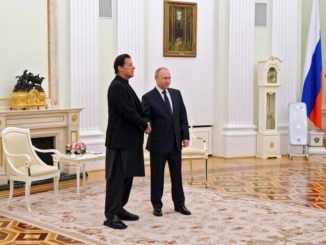
Pakistan’s Prime Minister Accuses U.S. Diplomat of ‘Conspiracy’ to Overthrow His Elected Government
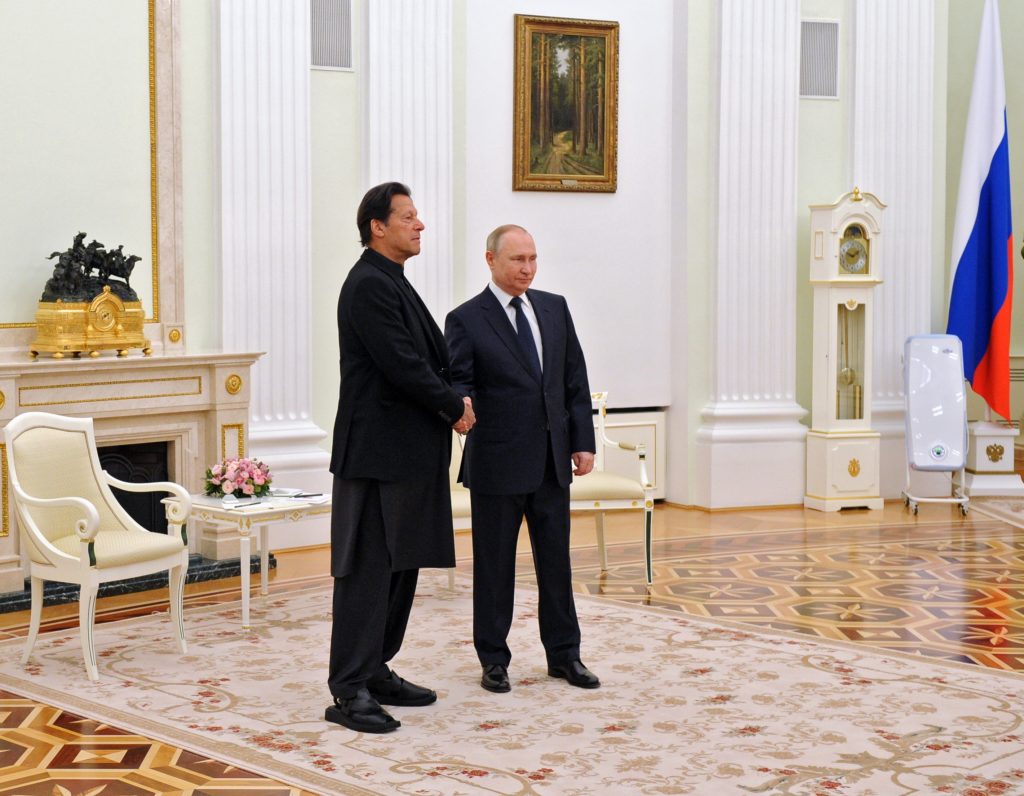
Editor’s Note: This article was originally published by Multipolarista.
Pakistan’s Prime Minister Imran Khan has accused a top U.S. diplomat of threatening his government as part of a “foreign conspiracy” to overthrow him.
This March, opposition politicians in Pakistan tried to push a no-confidence motion through the National Assembly, seeking to remove Khan from office.
Khan, who was democratically elected in 2018, said the U.S. government was supporting these opposition lawmakers in their attempt to oust him.
“I’m taking the name of U.S., the conspiracy has been hatched with the help of America to remove me,” the Pakistani prime minister said, in Urdu-language comments translated by the media.
In a meeting with leaders of his political party, Pakistan Tehreek-e-Insaf (PTI), Khan singled out Donald Lu, the U.S. assistant secretary of state for the Bureau of South and Central Asian Affairs.
According to the prime minister, Lu threatened Pakistan’s ambassador to the United States, Asad Majeed, warning that there would be serious “implications” if Khan was not ousted.
Washington allegedly told Majeed that U.S.-Pakistani relations could not improve if Khan remained in power.
Khan accused the U.S. embassy of organizing Pakistani opposition lawmakers to vote for the no-confidence motion in the National Assembly.
In previous comments, Khan had also said that Washington sent a letter threatening him for rejecting its attempts to create U.S. military bases in Pakistan.
Khan hinted that the soft-coup attempt was aimed at reversing his independent foreign policy. Under Khan, Pakistan has deepened its alliance with China, greatly improved relations with Russia, and maintained staunch support for Palestine.
Washington has rejected these allegations. However, Khan’s comments are bolstered by testimony that Lu himself gave in a March 2 hearing of the U.S. Senate Subcommittee on Near East, South East, Central Asia and Counterterrorism.
A video clip of Assistant Secretary of State Lu in the hearing, which went viral on Twitter, shows him admitting that the U.S. government had pressured Pakistan to condemn Russia for its military intervention in Ukraine.
Khan’s government has refused to denounce Moscow, joining many other countries in the Global South that have remained neutral in the NATO-Russia proxy war.
This is Huge !
US under Secretary Donald Lu admits he approached Pakistani FO officials as Pakistan abstained to vote against Russian aggression against Ukraine.
Sri Lanka also abstained from voting and “ facing Financial crisis ” while Regime Change attempt in Pakistan. pic.twitter.com/FeNkkFBQ5F
— MNA (@Engr_Naveed111) April 4, 2022
Lu’s video testimony confirms that Washington is angry because of Islamabad’s growing relations with Moscow.
Imran Khan met with Russian President Vladimir Putin at the Beijing Olympics. The Pakistani leader subsequently took a trip to Moscow on February 24, the beginning of the military campaign in Ukraine.
After his visit, Khan announced that Pakistan would be expanding its economic ties with Russia, importing its wheat and gas, while ignoring Western sanctions.
Although the country is a close ally of China, Pakistan has for decades had a difficult relationship with Russia. Under Khan, Islamabad’s tensions with Moscow have significantly softened.
Pakistani scholar Junaid S. Ahmad published an article in Multipolarista analyzing the numerous reasons why Washington would want to remove Imran Khan from power, including his growing alliance with China and Russia, his refusal to normalize relations with Israel, and his gradual move away from Saudi Arabia.
Pakistan’s opposition is trying to overthrow Prime Minister Imran Khan with a no-confidence motion.
Khan says he has proof of foreign funding for a regime-change op to reverse his independent foreign policy – especially his alliance with China and Russiahttps://t.co/wdIqWDlqss
— Benjamin Norton (@BenjaminNorton) April 1, 2022
The deputy speaker of Pakistan’s National Assembly, Qasim Suri, suspended the opposition’s no-confidence motion, arguing that it was unconstitutional because it was part of a “conspiracy” supported by “foreign powers.”
This means that Khan has 90 days to hold snap elections.
There are worries in Pakistan, however, that the soft-coup attempt against Khan could escalate into an old-fashioned military coup.
Pakistan’s army is very powerful, and notorious for overthrowing civilian leaders. An elected Pakistani prime minister has never completed a full term.
Pakistan’s military is also closely linked to the United States, and frequently acts to promote its interests.
In concerning comments made in the middle of this controversy, Pakistan’s Chief of Army Staff Qamar Javed Bajwa praised the United States and Europe. Breaking with the elected prime minister, he criticized Russia over its war in Ukraine.
These remarks suggest that Khan may have lost the support of top military leaders.
General Bajwa: ‘We share a long history of excellent relationship with the United States which remains our largest export market; UK/EU vital to our national interests; Russian aggression on Ukraine is very unfortunate, this is a huge tragedy.’
This is huge. pic.twitter.com/4bufYu45Lc
— Murtaza Ali Shah (@MurtazaViews) April 2, 2022
